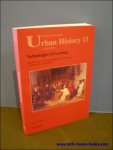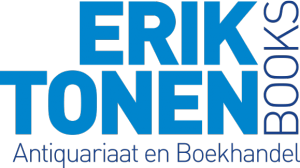Stel een vraag
Met het formulier hier onder kunt u contact op nemen met boekwinkel Erik Tonen Books.
DE MUNCK, Bert. - TECHNOLOGIES OF LEARNING. APPRENTICESHIP IN ANTWERP GUILDS FROM THE 15th CENTURY TO THE END OF THE ANCIEN REGIME.
De vraag gaat over de volgende titel:
| Afbeelding: |

|
|---|---|
| Schrijver: | DE MUNCK, Bert. |
| Titel: | TECHNOLOGIES OF LEARNING. APPRENTICESHIP IN ANTWERP GUILDS FROM THE 15th CENTURY TO THE END OF THE ANCIEN REGIME. |
| ISBN: | |
| Uitgever: | Turnhout , Brepols, 2007 |
| Bijzonderheid: | Pictorial softcover, illustrated cardboard, 175 x 250mm., 305pp., b/w illustration. ISBN 9782503522708. |
| Prijs: |
€ 65,00
€ 6,99
|
| Meer info | The importance of training and education is on the increase. While the production of 'human capital' is seen as a motor for a competitive economy, skills and expertise proof to be necessary for social mobility. Remarkably, in conceiving modern forms of 'apprenticeship', several mechanisms from the acien regime, seem to return. The difference between public and private initiative is disappearing, education and training is being confused, and in order to acquire generic skills as flexibility, communicability, self-rule, creativity and so on, youngsters have to learn -in context-. Even for maths, scholars now talk of 'situated learning'. Before the advent of a formal schooling system, training took place on the shop floor, under the roof of a master. The apprentice not only worked but also lived in his master's house and was thus trained and educated at the same time. In cities, this system was formally complemented by an official apprenticeship system, prescribing a minimum term to serve and an obligatory masterpiece for those who wanted to become masters themselves. Traditionally, historians see this as an archaic and backward way of training, yet this book's aim is to show that is was instead a very flexible and dynamic system, perfectly in tune with the demands of an early modern economy. In order to understand it fully, however, we should differentiate the informal training system organised via a 'free market' of indentures on the one hand and the institutionalised system of craft guilds on the other. In Antwerp, early modern guilds had a project of 'emancipating' their members. They didn't simply produce certain skills, but through a system of quality marks defended the honour of craftsmen. This is the difference with current practices. By representing hands-on skills as superior, guilds supplied a sort of symbolic capital for workers. New book. |
| Boek bekijken | |

We sturen uw bestelling via verzendpartner POSTNL ** tarief voor alle pakjes ongeacht het gewicht is 6.99 Euro voor Nederland en België. U ontvangt van ons altijd een bevestiging en een factuur per e-mail.
De verkoper zal binnen 3 werkdagen contact met u opnemen om de koop verder af te handelen.

